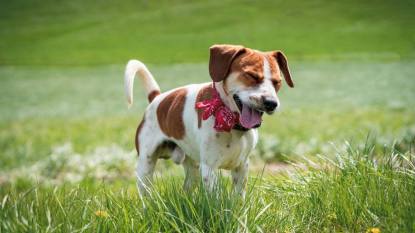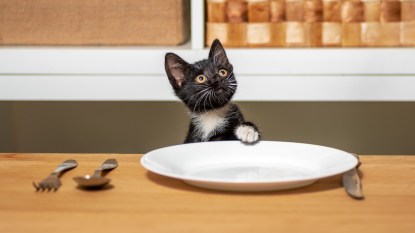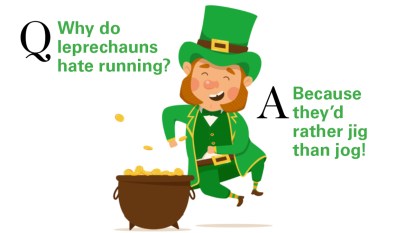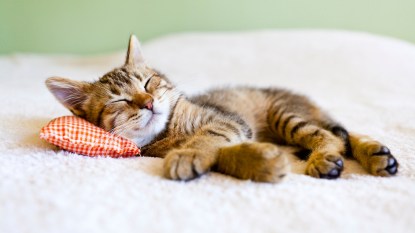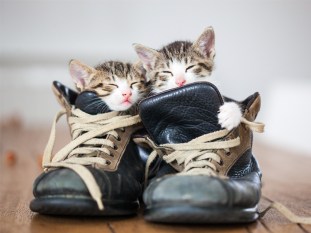Why Do Dogs Roll in Poop — The Cute Instinct Behind the Gross Behavior and How to Stop It
Plus, why they seem compelled to dig holes in your yard!
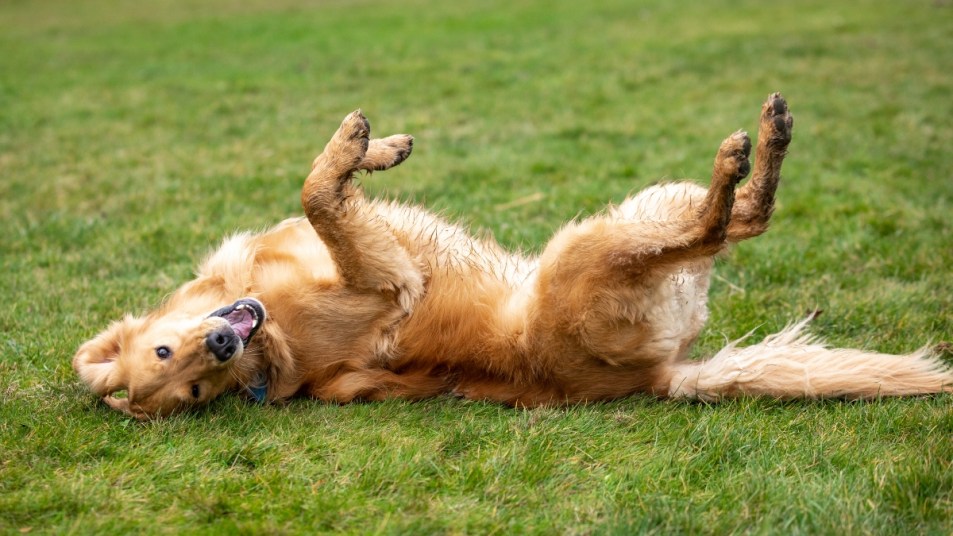
If you have a dog, you’re probably constantly entertained. Whether they’re barking at their reflection or falling asleep in bizarre positions that can’t possibly be comfortable, their quirky behaviors are part of their charm. There are, however, some less charming habits, like rolling around in piles of other animals’ poop, leaving you to deal with the stinky, messy aftermath. While seemingly random, this behavior is instinctual — a manifestation of domesticated dogs’ wild, wolfy roots. So if you’ve ever wondered why do dogs roll in poop, keep reading to see what vet experts say about this and other weird things your dog does on instinct.
Why do dogs roll in poop?
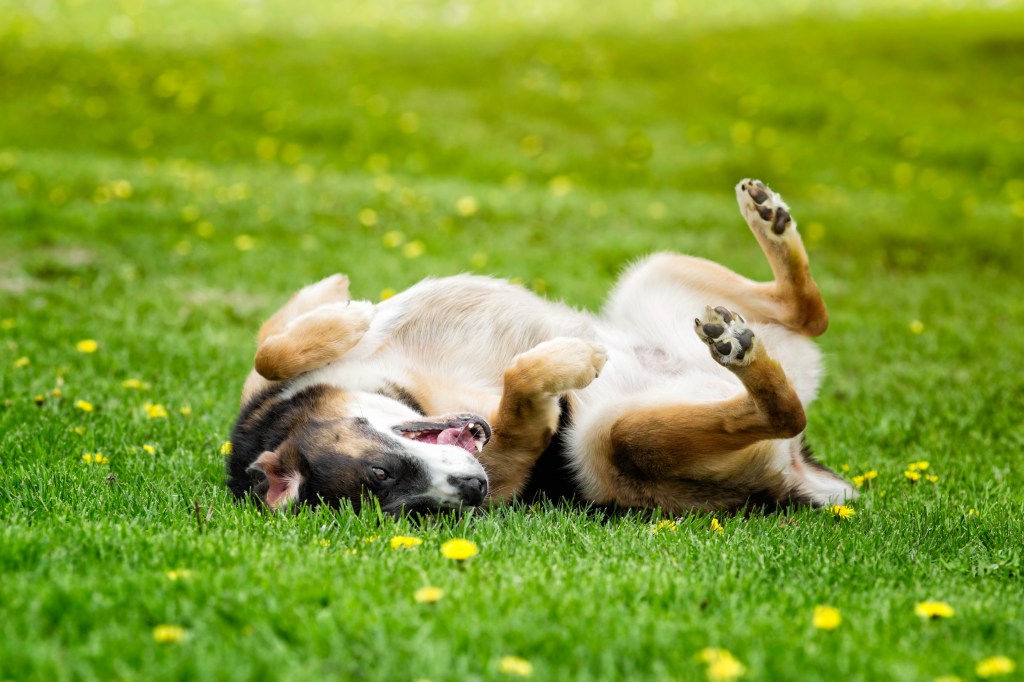
No matter the breed, one of the most common (and disgusting) instinctual behaviors in dogs is rolling in poop. Picture it: You’re taking Spot for a nice walk in a riverside park when, all of the sudden, he drops to the ground to roll on top of a pile of poop, coating himself in the odor and creating an unpleasant mess for you to deal with later. Yuck. But your pup doesn’t do this to make the ride home miserable — rather, he’s putting the “stink” in “instinct” and acting on ancestral urges.
“While this is super gross, dogs (and wolves) have been doing it for a very long time,” says Nicole Ellis, a certified professional dog trainer and pet lifestyle expert with Rover. “This is known as scent-rolling, and it’s believed to be done to mask their scent and possibly to communicate to others about the environment around them.”
“By masking their scent with the smell of other animals, wolves could approach their prey without being detected. It’s like their version of going undercover,” adds Dr. Sabrina Kong, veterinary contributor at We Love Doodles. So even though your pup’s only prey is whatever you happen to drop under the dinner table on accident, he feels the natural urge to go into super-sleuth mode simply because it’s what his ancestors have done.
“Another theory is that they simply like the smell. Just as we might enjoy the scent of fragrant perfume, dogs might be attracted to more potent, earthier odors,” notes Dr. Kong. If only they’d roll in a flower bed instead!
What to do if your dog rolls in poop
As tempting as it is to get upset, don’t raise your voice or punish your dog. He doesn’t understand why he has a primal urge to do this either, so be patient. Carry dog-safe wet wipes with you to clean him up, and consider bringing some baking soda along on your walks if Fido is a repeat offender. “It’s great for neutralizing odors, especially if you’re in a pinch,” says Dr. Kong. Just sprinkle some on his coat, then brush it out when you get home. Ellis also recommends putting your dog in a biothane collar — they’re made of polyester webbing with a waterproof coating. That makes them easier to wash off and sanitize compared to other collars (Buy from Amazon, $31.46).
Can you train your dog not to roll in poop?
If your dog frequently rolls in poop, you may be wondering how you can get him to stop. The key to training your pup not to engage in this behavior is diversion and positive reinforcement. “When you’re out on walks, always be vigilant. If you see your dog starting to sniff around a particular spot with that ‘I’m about to roll’ look, distract them with a command or a toy,” recommends Dr. Kong. “Positive reinforcement can also be effective, like treats or praise when they listen to your command.” (Click through for other ways positive reinforcement benefits your dog.)
Other weird things your dog does on instinct
What other things does your dog do based on their wild instincts? As it turns out, a lot. Some of your dog’s weirdest quirks, like choosing to sleep right next to the expensive bed you bought them instead of in it, or being afraid of lettuce (like this dog), are inexplicable. Like humans, dogs have their own unique personalities. Some behaviors might be breed-specific, too: For example, your herding dog may nip at heels and round up your family, and your Labrador retriever may bring you random items from around the house for fun. Below are some other common pup behaviors and the explanations for them. They’re proof that you can take the dog out of the wilderness, but you can’t take the wilderness out of the dog.
Turning in circles before lying down
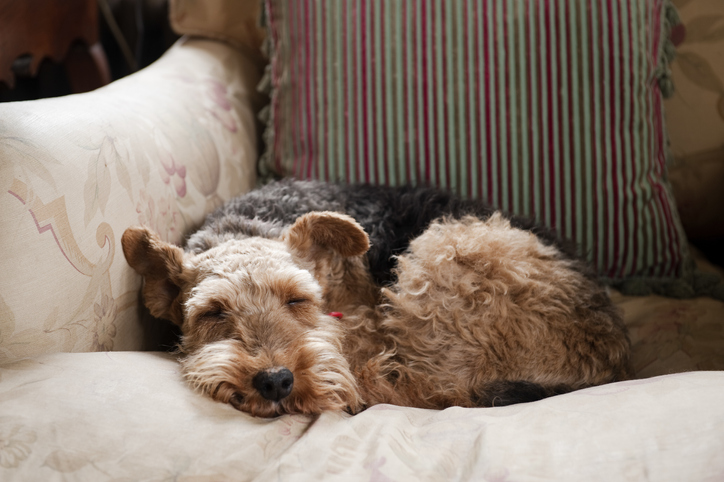
Watching your dog perform sleepy rotations before snuggling in for the night is an adorable, albeit confusing sight, and one of several inherited behaviors. Because dogs’ wild ancestors didn’t have fluffy beds or blankets to cuddle up on, they would spin in place to pat down grass and clear away debris for a comfy napping nest. This circling may also have been a way for dogs to properly survey their surroundings before letting their guards down to rest. Keep in mind that if your dog is circling excessively before resting, or is having trouble getting settled, it may be a sign that they’re experiencing back or joint discomfort, and you should contact your vet. (Click through to see what your dog might be dreaming about once he’s asleep.)
Digging holes
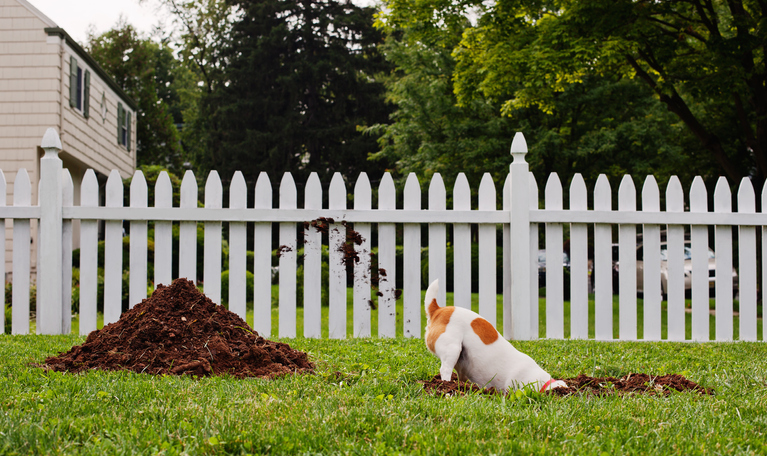
Knowing the holes in your freshly planted garden were dug because of your dog’s primal instincts doesn’t make them any less frustrating. Though terriers — who were bred to hunt small animals like rabbits — are common culprits of this behavior, many dogs engage in digging because of things they smell underground. It’s an instinctual hunting behavior inherited from ancestors. Digging holes also enables dogs to bury treasured items, like toys or treats, to “protect” them from being stolen. Wild dogs would even bury extra food underground to keep it safe and fresh.
If your dog has developed a habit of digging, there are some ways you can encourage him to stop. He may need to burn off extra energy — try incorporating an extra walk or rigorous play session into her routine. You can also place physical barriers, like rocks or chickenwire, that prevent your pup from penetrating the soil.
Dogs are fascinating animals. Though it’s been thousands of years, they still perform the same behaviors as their wild ancestors. Who knows how dogs will behave in another thousand years? With all the pampering they get now, they’ll probably demand five-star meals instead of settling for scraps. (And honestly, they do deserve the best.)
Related: Out of Dog Shampoo? A Vet Explains Why You Should Never Use People Shampoo + What To Use Instead
From wolf to house pet
Most of the weird things dogs do are from deeply rooted instincts informed by their wild roots. If you have a husky or a German shepherd, it’s not hard to tell that your pup descended from wolves. But no matter how deeply you look into the eyes of your Shih Tzu or Maltese, their wild ancient ancestors are more difficult to imagine. Regardless, they, too, act on instinct.
We don’t know the exact details of how all breeds of domesticated dogs came to be, but Encyclopedia Britannica reports that over tens of thousands of years, humans trained and bred wild dogs to develop certain traits and make them companions, hunters and protectors. As a result, there are now more than 400 distinct breeds, all descended from the gray wolf.
How did humans accomplish this feat? Likely, by offering the same thing you do to persuade your dog to behave — treats. Researchers believe that during the Ice Age, humans shared food scraps with wild dogs, which conditioned them to look at humans as benefactors instead of enemies, and may have begun the domestication process. So, next time Fido begs for your table scraps, just remember that he can’t help it; it’s in his DNA. While this knowledge doesn’t make his messes any more fun to clean up, it at least explains why he acts the way she does.
Want to learn more about what’s going on in your dog’s head? Check out the stories below:
The Secret Lives of Little Dogs — What You Should Know as a Small Pet Owner
Are Dogs Ticklish? Vets Reveal the Most Common Canine “Giggle” Triggers
Dogs Like (and Understand) Baby-Talk — Here’s How What Scientists Call “Dognition” Works
Do Dogs Like Music? Vet Experts Say Yes — But Only If You Play *These* Tunes
How to Stop a Dog From Digging: Vets Reveal 4 Easy Ways to Stop the Behavior for Good


